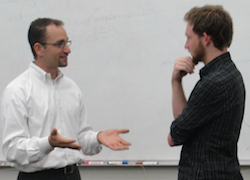The Greenulus Package
The Green Economy may be coming. And it may not.
Barack Obama won his first legislative battle with the Republican minority in congress and passed the Economic Stimulus package he feels is needed to jumpstart America’s economy. 
The package includes money for what many are calling the green economy. Obama has committed $15 B annually to clean energy programs, including wind, solar, biofuels, energy efficiency, geothermal, and others.
What’s in it for the eco-entrepreneur? Or, as many are now calling it, the ‘Obamapreneur’?
The quickest wins and lowest hanging fruit for the green economy and Obama’s plans lie in energy efficiency. As the saying goes, the cleanest power plant is the one you don’t have to build, and with buildings accounting for 72% of all energy usage in the U.S., greening these buildings would provide good jobs, and freedom from high energy bills. Robert Pollen, an economist at the University of Massachusetts at Amherst, estimates there are $26 B worth of upgrades on public buildings alone in the U.S. that need to be done, with terrific return on investment for the government in terms of job creation and long term savings on energy.
Obama’s economic team has estimated that 5 million green jobs will be created by this $15B in annual investment, and that these jobs will be difficult to outsource or replace.
It may be less obvious to see the effect on aspiring entrepreneurs and small business owners, but the possibilities are good. People interested in becoming an energy audit specialist are going to be in high demand as we green up all these buildings. If you want to learn more, you can visit Housing and Urban Development’s Home Energy Saver tool. The key, if you are looking to get into greening for low-income housing and government buildings, is to be sure you are familiar with Title 1. A list of Title 1 approved lenders can be found at this address, and it would behoove you to become familiar with their customs and preferred work patterns. Less scrupulous contractors scammed the government while working on subsidized housing, and as part of the effort to clean up the corruption, Title 1 approved lenders are maintaining databases of reliable contractors. While most of these have traditionally been remodeling and repair, the energy efficiency spending in the stimulus package will become quite the boon to contractors in that niche, so long as they are reliable and trustworthy.
If you’re looking to join a team to do efficiency work, two good options currently exist: Green Irene and Sustainable Spaces. These companies allow you to be your own boss and provide training to get you going.
The other major takeaway from the stimulus package, without getting too bogged down in the details, is to see that Obama has made a clear signal of where he intends to steer the ship. It would be easy for him focus on the symptoms of the problem, as his predecessor did, and maybe get a few quick wins without sticking his neck out too far, but he has not lost site of what got us into this trouble. Deficits, climate change, and dependence on foreign oil are real problems, which, “left unaddressed, will continue to weaken the economy and threaten national security,” he said. The fact that he is signaling such a clear direction means that entrepreneurs will know where to put their money and effort in the energy, building, and transportation sectors, knowing that the federal government is behind them, at least for the next four years.
Photo Credit Joel Washing on Flickr Creative Commons
Scott Cooney
Scott Cooney (twitter: scottcooney) is an adjunct professor of Sustainability in the MBA program at the University of Hawai'i, green business startup coach, author of Build a Green Small Business: Profitable Ways to Become an Ecopreneur (McGraw-Hill), and developer of the sustainability board game GBO Hawai'i. Scott has started, grown and sold two mission-driven businesses, failed miserably at a third, and is currently in his fourth. Scott's current company has three divisions: a sustainability blog network that includes the world's biggest clean energy website and reached over 5 million readers in December 2013 alone; Pono Home, a turnkey and franchiseable green home consulting service that won entrance into the clean tech incubator known as Energy Excelerator; and Cost of Solar, a solar lead generation service to connect interested homeowners and solar contractors. In his spare time, Scott surfs, plays ultimate frisbee and enjoys a good, long bike ride. Find Scott on Google Plus

Get your signed copy of
Build a Green Small Business (McGraw-Hill)!
Or...talk with the author!
Click here to schedule an hour consultation.
 Green franchise opportunities:
Other green business ideas
Green franchise opportunities:
Other green business ideas
- Healthy Fast Food
- Farmer's Market
- Personal Trainer & Diet Planner
- Juice Bar and Smoothie Café
- Green Building Materials Store
- Permaculture and Urban Farming
- Edible and Organic Floristry
- Energy Efficiency Auditing
- Ecotourism and Sustainable Travel Planner
- Sustainable Coffee House
- Consignment Shop for Kids Clothing & Toys
- Natural Foods Co-op
- Sustainable Food Prep and Cooking Instruction
- Food Plant Nursery
- Mesh Network Telephone and Internet Company
- Drive-thru Coffee Stand & Espresso Shop
- Eco-Friendly House Cleaning Service
- Organic Backyard Garden Landscape Design
- Green Bed and Breakfast (B&B)
- Sustainable Mobile Food Vendor
- Biodiesel Cooperative
- Eco Friendly Pool and Spa Cleaning
- Green Wedding and Sustainable Event Planner
- Organic Farm
- Gift Basket Service
- Pedicab Company
- Used Books Vending Machines
- Organic Day Spa
- Restaurant Food Delivery Service
- Used Bicycle Retailer
- Landscape Maintenance in Arid climates
- Organic Food Delivery Service
- Outdoor Gear Consignment Shop
- Eco Concierge Service and Relocation Specialist
- Organic Community Supported Agriculture
- Sustainable Property Management
- Residential Solar


